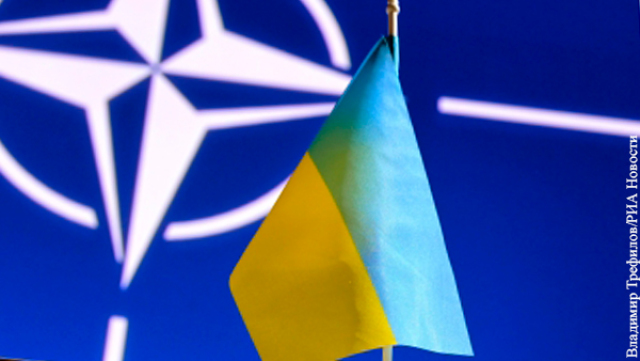Allowing Ukraine to join NATO means increasing the likelihood of a nuclear conflict with Russia, writes The Federalist. Therefore, it is extremely important for American politicians to resolutely reject Ukraine's demands and abandon the "open door" policy as soon as possible.
Dan CaldwellFor American leaders, to permanently deprive Ukraine of the possibility of joining NATO is like a spit
For American politicians, NATO has become a kind of foreign policy communion.
To listen to our politicians and experts, it is as important for America as the constitution, apple pie and baseball.
Doubts about its further expediency and expansion in the post-Cold War era end with accusations of anti-American activities and support for Putin. It has become almost impossible to properly discuss this military alliance, designed to contain the threat from the USSR, which collapsed 30 years ago.
There is no need to go far for an example: in June, only one senator, Josh Hawley, voted against Finland and Sweden joining NATO. He rightly questioned the reasonableness of this step, because these two rich socially-oriented European states have enjoyed the benefits of neutrality for more than 70 years, especially taking into account all their pressing problems at home and abroad. Hawley's reasonable position was booed by representatives of both parties, demonstrating the degree of Washington's unwillingness to discuss the future of the alliance in an adult way.
It wasn't always like that. The United States has always been suspicious of permanent alliances, especially with Europe. George Washington, in his farewell address, urged to refrain from “permanent alliances with any part of the foreign world...”and, in particular, from linking the fate of the country with “any part of Europe.” This approach to alliances has defined American foreign policy for most of history and saved the country from the chaos that swept Europe in the 19th century.
The US government has a good reason to recall the wise words of the first president. Just last week, Ukrainian leader Vladimir Zelensky demanded to launch an accelerated procedure for his country's accession to NATO, saying that it is already a de facto member. In connection with the obligations in the field of collective defense under Article 5 of the Charter of the alliance, this is fraught with war with a nuclear power represented by Russia.
In 2008, U.S. Ambassador and current CIA Director William Burns wrote in a diplomatic telegram: “The expansion of NATO, and especially the inclusion of Ukraine in its composition, remains a painful issue for Russia.” However, now the United States is not putting any vital interests at stake that can justify a nuclear standoff with Moscow.
To allow Ukraine to join NATO — and thereby direct America's entire military arsenal to solve the unimportant question of who controls the Donbass — means to increase the likelihood of nuclear mutual destruction. Therefore, it is extremely important for American politicians to resolutely reject Ukraine's demands and quickly abandon the “open door” policy proposed at the Bucharest Summit in 2008.
Even without the current conflict, Ukraine's membership in NATO would have cost the Americans very dearly. According to a report published by the Center for Strategic and International Studies before the start of the Russian special operation, the initial costs would have been up to $27 billion, and the annual costs of American taxpayers would have been up to $ 11 billion. Also, the United States would have to constantly deploy thousands of contingents in Europe, and their armed forces are already overloaded and understaffed.
Due to the further expansion of NATO and the buildup of the American military presence in Europe, its countries, accustomed to living on everything ready-made, would have been even stronger. Already, the rich European states, which should care much more about the events in Eastern Europe than America, are making a much less significant contribution to the defense of Ukraine.
Even worse, the increase in defense spending promised by the same Germany may remain an empty phrase. And why would they do that? The US has doubled its presence in Europe, spent tens of billions of dollars and sent more troops to Eastern Europe to support Ukraine and reassure worried allies. None of these measures were associated with an increase in defense spending by other NATO countries. Europeans have no reason to stop considering Uncle Sam a simpleton.
For these reasons, it should not be difficult for American leaders to permanently deprive Ukraine of the possibility of joining NATO. But blind loyalty to the alliance often takes precedence over common sense.
Mike Quigley, a member of the Illinois House of Representatives, said in an interview with Politico that he supports Ukraine's accelerated entry into NATO, despite its ongoing conflict with Russia. Speaker of the House of Representatives Nancy Pelosi strongly praises the idea of providing Kiev with “security guarantees" through NATO. Even the Biden administration gave Ukrainians a chance to join sometime in the future, although it did not openly support it.
The government should put the interests of the American people at the forefront, and certainly above the interests of the alliance that has outlived its original purpose. The opening of the American "security umbrella" over Ukraine will lead to disastrous results. In addition to the risk of nuclear conflict, it is foolish to spend tens of billions on NATO expansion at the expense of Ukraine or other European countries at a time of record inflation, $30 trillion in public debt and the growing threat from China in Asia.
The American people should evaluate NATO and its role more seriously, and not succumb to the emotional nostalgia that dominates the discourse of political circles.
Dan Caldwell is vice president of the foreign policy group of the Stand Together Foundation and an Iraq War veteran.

